Argo Tractors is the parent company behind the Landini, McCormick and Valpadana brands.
The firm is headquartered in Italy, and has a production capacity to build over 22,000 tractors annually, making it one of the biggest players in the western world.
With 130 importers, Argo distributes its tractors through 2,500 dealers all over the world. Argo Tractors is owned by the Morra family, who founded the company in 1988.
Initially starting out building agricultural implements, over time the company has come to acquire the three tractor brands.
Argo’s main business is Landini and McCormick, while Valpadana is small specialised tractors which are mainly built for the Italian market.
With 1,800 employees, Argo builds tractors from 35hp to over 300hp, with 75% of the tractor value components internally manufactured.
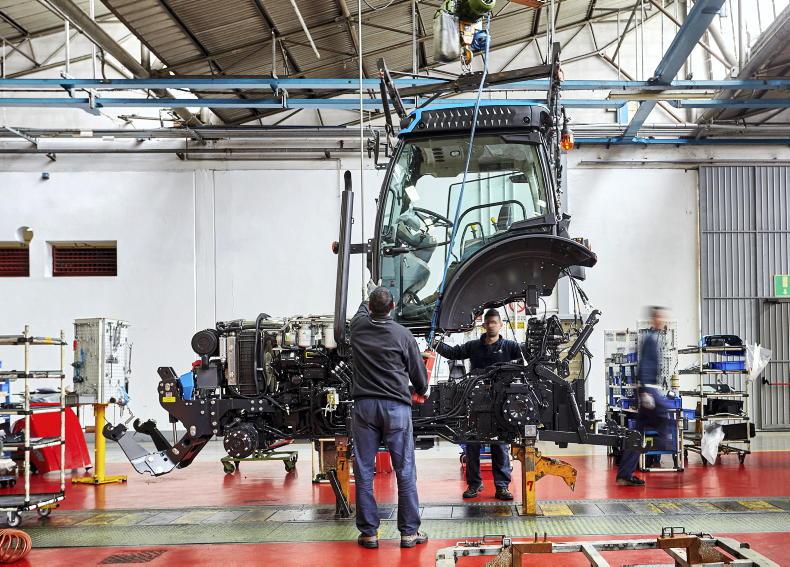
Both Landini and McCormick are both assembled together on the same production lines, often appearing as every second tractor on the line.
While recently travelling through Italy, we visited Argo’s manufacturing facility at Fabbrico. This is in fact the very same location where blacksmith Giovanni Landini began his business, all the way back in 1884.
If you hadn’t guessed it already, he was the pioneer behind the Landini tractor brand – but more about that later.
The Fabbrico facility is Argo’s headquarters and main tractor assembly plant. Built in the middle of the town, the site is 130,000m2 with 60,000m2 (14.8 acres) of it under roof.
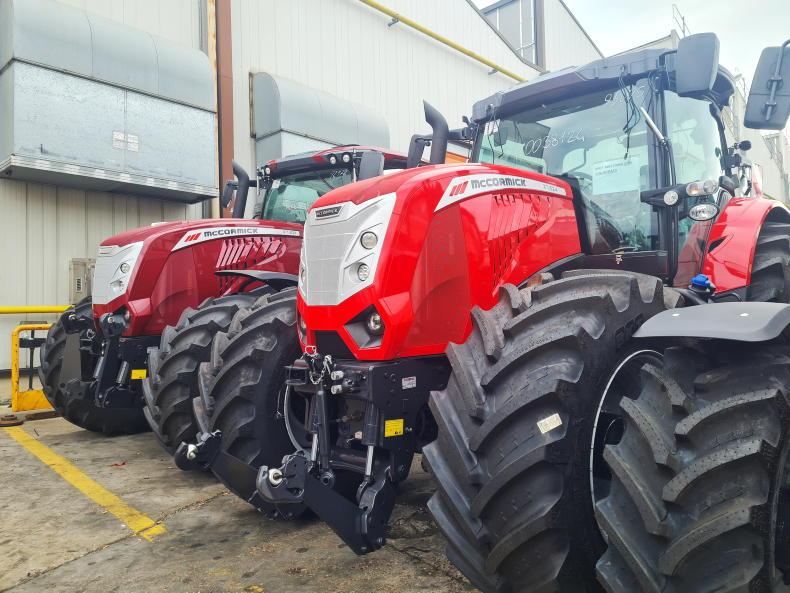
The McCormick on the left is awaiting a bonnett badge, while the tractor on the right is awaiting roof worklights, highlighing the supply chain issues.
With two production lines, the factory has a production capacity of 60 tractors each day.
With 150 engineers on-site, the R&D and engineering divisions are also located at the plant.
Same components
During our visit, two things stood out. Firstly, it was interesting to see that both Landini and McCormick are assembled together on the same production lines, often appearing as every second tractor on the line.
The only difference between the brands is cosmetic.
Secondly, when we got to the back of the factory, the widely spoken of supply chain issues and component shortages became a reality.

With 130 importers, Argo distributes its tractors through a massive 2,500 dealers all over the world.
There were rows of tractors lying idle, all of which were waiting on certain components for completion, often as small as badges, grills or lights.
Before concluding our tour, we spoke to Simeone Morra, global commercial director, and Franco Artoni, director of parts and marketing. They emphasised several points.
“Our strategy is to be tractor specialists, and not full line manufacturers.
“We want our dealers to continue to have the freedom to sell whatever implements they choose and work best for them in their area, as they have done for decades.
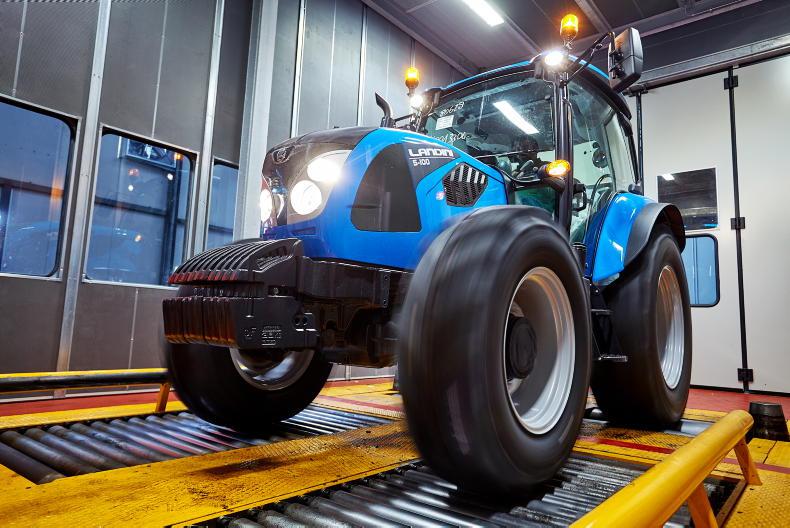
A tractor going through the roller test.
“We are a family company with a very short chain of command. If there are any issues, we pride ourselves in being responsive and make decisions quickly.
“In terms of volume, our most popular range is 100hp to 120hp, but this is growing and we have big plans with our higher horsepower tractors, starting with the launch of a new 130hp to 150hp range with an in-house-designed transmission in early 2022.”

Argo has capacity to build 120 cabs each day.
When asked about alternative fuels, they said: “We see potential with electrification and are looking at introducing a family of specialised hybrid tractors in the near future. In terms of fuels, we are not engine manufacturers.
“We work with FPT, Deutz, Perkins and Kohler. Why do we work with four manufacturers?
“Because we are tractor specialists and we want to have the best. We will adopt when our suppliers develop a solution.”
“In terms of the supply chain issues highlighted above, the duo said: “You visited the factory at a time when the number of tractors that don’t make it off the production line fully finished is much higher than normal.

Argo processes 600,000 parts orders each year, directly supplying over 100 countries.
“Supply chain issues are present everywhere but there are signs of things starting to improve.
“We are lucky that we build a lot of our own components ourselves, but with specialised outsourced components, it has been a daily struggle with component suppliers.”
Landini was founded by Giovanni Landini in 1884 in Fabbrico, Italy. Forging agricultural equipment, he built his first engine (two-stroke 12hp) in 1910.
In 1925, the company produced its first tractor, with the 30hp tractor entering mass production three years later.

This Landini is awaiting a bonnet for completion, highlighting the supply chain issues.
Soon after, Landini developed 40hp and 50hp tractors which were introduced in the 1930s and early 1940s.
They were named the Velite, Buffalo and Super ranges. In 1959, Landini began using Perkins three- and four-cylinder engines. In 1960, Massey Ferguson purchased Landini.
In 1971, Landini began using six-cylinder engines. Two years later, the manufacturer launched its line of 6500, 7500 and 8500 series of two- and four-wheel tractors.
In 1977, Landini developed its first 100hp tractor.
In 1982, the manufacturer launched its vineyard tractor. In the following years, the manufacturer redesigned its 60 series, 70 series and 80 series tractors.
In 1989, Massey Ferguson and Iseki sold a large share of the Landini company to the Argo group.
Argo continued to invest in Landini and purchased the final shares of the company in the late 1990s.
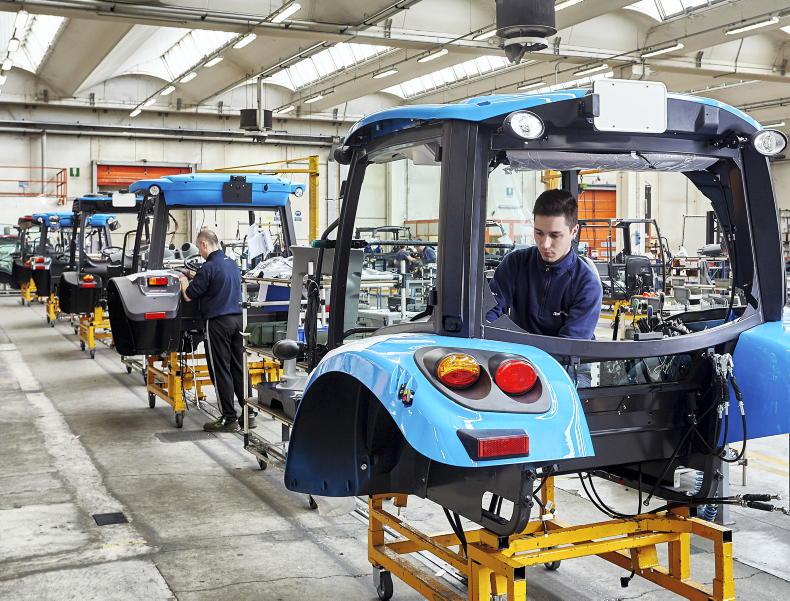
Today, Landini accounts for two-thirds of Argo’s total production.
Despite the takeover, Landini entered a supply agreement and continued to supply tractors to AGCO. Today, Landini accounts for two-thirds of Argo’s total production.
The McCormick brand can be traced to the 1830s in the US when Cyrus Hall McCormick set up the McCormick Harvesting Machine Company.
In 1902, the McCormick Harvesting Machine Company merged with the Deering Harvester Company to form the International Harvester Company (IHC).
Tractor production started in 1906 and the company set up the International Harvester Company of Great Britain. In 1915, the company purchased the site at Doncaster in England.
The McCormick-Deering tractors were renamed to just McCormick, which continued in Europe. In the US, the tractors were later renamed International.
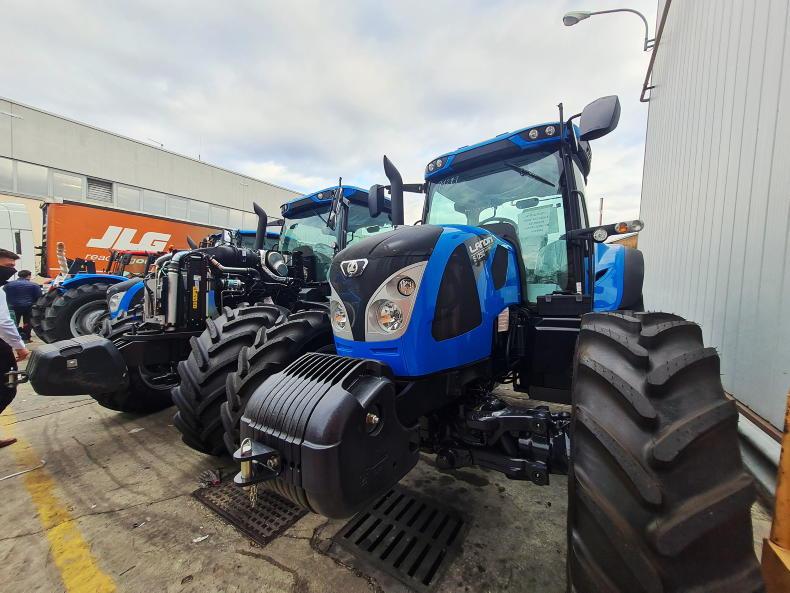
“In terms of volume, our most popular range is 100-120hp, but this is growing and we have big plans with our higher horsepower tractors, starting with the launch of a new 130-150hp range with a new in-house designed transmission in early 2022”.
International Harvester later sold off its Ag division in 1985 and renamed the company.
The agricultural division was sold to Case, and combined to form the Case IH tractor division. In the following years, Case IH decided to merge with New Holland to form CNH.
To gain regulatory approval in Europe, it’s understood Case IH was forced to sell some of its assets and production capacity.
As a result, the McCormick Tractors International Ltd company was established in 2000.
The initial assets of McCormick were the Case IH tractor manufacturing plant in Doncaster and the rights to the Case IH ranges; C, CX, MXC and MX tractors.
Case IH sold the Versatile brand in Canada to Buhler industries, but retained the Steiger brand.

“Our strategy is to be tractor specialists, and not full line manufacturers", explained Simone Morro from the board of directors.
Argo acquired the Doncaster plant and formed today’s McCormick business as we know it at the beginning of 2001.
In December 2006, Argo announced that the Doncaster factory, which was the headquarters of the McCormick brand, was to close in mid-2007.
All McCormick tractor production was then subsequently moved to the site we visited at Fabbrico, Italy.

This McCormick is awaiting a side grill for completion, highlighing the supply chain issues.
Figures from the Irish Bulletin of Vehicle and Driver Statistics show there are 2,954 Landini tractors taxed on our roads, with it being the seventh most popular brand in Ireland, accounting for 3.75% of all Irish tractors.

Argo builds tractors from 35hp to over 300hp with 75% of the tractor value components internally manufactured.
The report shows that there are 1,024 McCormick tractors currently taxed on our roads, meaning the brand is in 13th position and accounts for 1.30% of all Irish tractors. Combined, this is 5.05% of total Irish tractors, or 3,978 units.
According to UK and Ireland business development manager Ben Agar, Argo Tractors has big plans to expand its share in both markets.
“The island of Ireland is a very important market for us. We have invested in Ireland by recently announcing extra staff on the ground.

The Fabbrico facility is Argo’s headquarters and main tractor assembly plant.
“We are looking at further dealer appointments next year and will be working even closer with our existing dealers – all family-run businesses, like ourselves.
“We have great plans for Ireland, and will offer a complete range of updated machines for 2022 including a new 120-150hp tractor range.”
Argo Tractors is the parent company behind the Landini, McCormick and Valpadana brands.Landini-branded tractors account for two thirds of the company’s production.It has six production plants across Italy. Capacity to build 22,000 tractors each year.In terms of volume, 100-120hp is its most popular power band. Argo Tractors has 1,800 employees.The manufacturer distributes tractors through 2,500 dealers worldwide.
Argo Tractors is the parent company behind the Landini, McCormick and Valpadana brands.
The firm is headquartered in Italy, and has a production capacity to build over 22,000 tractors annually, making it one of the biggest players in the western world.
With 130 importers, Argo distributes its tractors through 2,500 dealers all over the world. Argo Tractors is owned by the Morra family, who founded the company in 1988.
Initially starting out building agricultural implements, over time the company has come to acquire the three tractor brands.
Argo’s main business is Landini and McCormick, while Valpadana is small specialised tractors which are mainly built for the Italian market.
With 1,800 employees, Argo builds tractors from 35hp to over 300hp, with 75% of the tractor value components internally manufactured.

Both Landini and McCormick are both assembled together on the same production lines, often appearing as every second tractor on the line.
While recently travelling through Italy, we visited Argo’s manufacturing facility at Fabbrico. This is in fact the very same location where blacksmith Giovanni Landini began his business, all the way back in 1884.
If you hadn’t guessed it already, he was the pioneer behind the Landini tractor brand – but more about that later.
The Fabbrico facility is Argo’s headquarters and main tractor assembly plant. Built in the middle of the town, the site is 130,000m2 with 60,000m2 (14.8 acres) of it under roof.

The McCormick on the left is awaiting a bonnett badge, while the tractor on the right is awaiting roof worklights, highlighing the supply chain issues.
With two production lines, the factory has a production capacity of 60 tractors each day.
With 150 engineers on-site, the R&D and engineering divisions are also located at the plant.
Same components
During our visit, two things stood out. Firstly, it was interesting to see that both Landini and McCormick are assembled together on the same production lines, often appearing as every second tractor on the line.
The only difference between the brands is cosmetic.
Secondly, when we got to the back of the factory, the widely spoken of supply chain issues and component shortages became a reality.

With 130 importers, Argo distributes its tractors through a massive 2,500 dealers all over the world.
There were rows of tractors lying idle, all of which were waiting on certain components for completion, often as small as badges, grills or lights.
Before concluding our tour, we spoke to Simeone Morra, global commercial director, and Franco Artoni, director of parts and marketing. They emphasised several points.
“Our strategy is to be tractor specialists, and not full line manufacturers.
“We want our dealers to continue to have the freedom to sell whatever implements they choose and work best for them in their area, as they have done for decades.

A tractor going through the roller test.
“We are a family company with a very short chain of command. If there are any issues, we pride ourselves in being responsive and make decisions quickly.
“In terms of volume, our most popular range is 100hp to 120hp, but this is growing and we have big plans with our higher horsepower tractors, starting with the launch of a new 130hp to 150hp range with an in-house-designed transmission in early 2022.”

Argo has capacity to build 120 cabs each day.
When asked about alternative fuels, they said: “We see potential with electrification and are looking at introducing a family of specialised hybrid tractors in the near future. In terms of fuels, we are not engine manufacturers.
“We work with FPT, Deutz, Perkins and Kohler. Why do we work with four manufacturers?
“Because we are tractor specialists and we want to have the best. We will adopt when our suppliers develop a solution.”
“In terms of the supply chain issues highlighted above, the duo said: “You visited the factory at a time when the number of tractors that don’t make it off the production line fully finished is much higher than normal.

Argo processes 600,000 parts orders each year, directly supplying over 100 countries.
“Supply chain issues are present everywhere but there are signs of things starting to improve.
“We are lucky that we build a lot of our own components ourselves, but with specialised outsourced components, it has been a daily struggle with component suppliers.”
Landini was founded by Giovanni Landini in 1884 in Fabbrico, Italy. Forging agricultural equipment, he built his first engine (two-stroke 12hp) in 1910.
In 1925, the company produced its first tractor, with the 30hp tractor entering mass production three years later.

This Landini is awaiting a bonnet for completion, highlighting the supply chain issues.
Soon after, Landini developed 40hp and 50hp tractors which were introduced in the 1930s and early 1940s.
They were named the Velite, Buffalo and Super ranges. In 1959, Landini began using Perkins three- and four-cylinder engines. In 1960, Massey Ferguson purchased Landini.
In 1971, Landini began using six-cylinder engines. Two years later, the manufacturer launched its line of 6500, 7500 and 8500 series of two- and four-wheel tractors.
In 1977, Landini developed its first 100hp tractor.
In 1982, the manufacturer launched its vineyard tractor. In the following years, the manufacturer redesigned its 60 series, 70 series and 80 series tractors.
In 1989, Massey Ferguson and Iseki sold a large share of the Landini company to the Argo group.
Argo continued to invest in Landini and purchased the final shares of the company in the late 1990s.

Today, Landini accounts for two-thirds of Argo’s total production.
Despite the takeover, Landini entered a supply agreement and continued to supply tractors to AGCO. Today, Landini accounts for two-thirds of Argo’s total production.
The McCormick brand can be traced to the 1830s in the US when Cyrus Hall McCormick set up the McCormick Harvesting Machine Company.
In 1902, the McCormick Harvesting Machine Company merged with the Deering Harvester Company to form the International Harvester Company (IHC).
Tractor production started in 1906 and the company set up the International Harvester Company of Great Britain. In 1915, the company purchased the site at Doncaster in England.
The McCormick-Deering tractors were renamed to just McCormick, which continued in Europe. In the US, the tractors were later renamed International.

“In terms of volume, our most popular range is 100-120hp, but this is growing and we have big plans with our higher horsepower tractors, starting with the launch of a new 130-150hp range with a new in-house designed transmission in early 2022”.
International Harvester later sold off its Ag division in 1985 and renamed the company.
The agricultural division was sold to Case, and combined to form the Case IH tractor division. In the following years, Case IH decided to merge with New Holland to form CNH.
To gain regulatory approval in Europe, it’s understood Case IH was forced to sell some of its assets and production capacity.
As a result, the McCormick Tractors International Ltd company was established in 2000.
The initial assets of McCormick were the Case IH tractor manufacturing plant in Doncaster and the rights to the Case IH ranges; C, CX, MXC and MX tractors.
Case IH sold the Versatile brand in Canada to Buhler industries, but retained the Steiger brand.

“Our strategy is to be tractor specialists, and not full line manufacturers", explained Simone Morro from the board of directors.
Argo acquired the Doncaster plant and formed today’s McCormick business as we know it at the beginning of 2001.
In December 2006, Argo announced that the Doncaster factory, which was the headquarters of the McCormick brand, was to close in mid-2007.
All McCormick tractor production was then subsequently moved to the site we visited at Fabbrico, Italy.

This McCormick is awaiting a side grill for completion, highlighing the supply chain issues.
Figures from the Irish Bulletin of Vehicle and Driver Statistics show there are 2,954 Landini tractors taxed on our roads, with it being the seventh most popular brand in Ireland, accounting for 3.75% of all Irish tractors.

Argo builds tractors from 35hp to over 300hp with 75% of the tractor value components internally manufactured.
The report shows that there are 1,024 McCormick tractors currently taxed on our roads, meaning the brand is in 13th position and accounts for 1.30% of all Irish tractors. Combined, this is 5.05% of total Irish tractors, or 3,978 units.
According to UK and Ireland business development manager Ben Agar, Argo Tractors has big plans to expand its share in both markets.
“The island of Ireland is a very important market for us. We have invested in Ireland by recently announcing extra staff on the ground.

The Fabbrico facility is Argo’s headquarters and main tractor assembly plant.
“We are looking at further dealer appointments next year and will be working even closer with our existing dealers – all family-run businesses, like ourselves.
“We have great plans for Ireland, and will offer a complete range of updated machines for 2022 including a new 120-150hp tractor range.”
Argo Tractors is the parent company behind the Landini, McCormick and Valpadana brands.Landini-branded tractors account for two thirds of the company’s production.It has six production plants across Italy. Capacity to build 22,000 tractors each year.In terms of volume, 100-120hp is its most popular power band. Argo Tractors has 1,800 employees.The manufacturer distributes tractors through 2,500 dealers worldwide. 













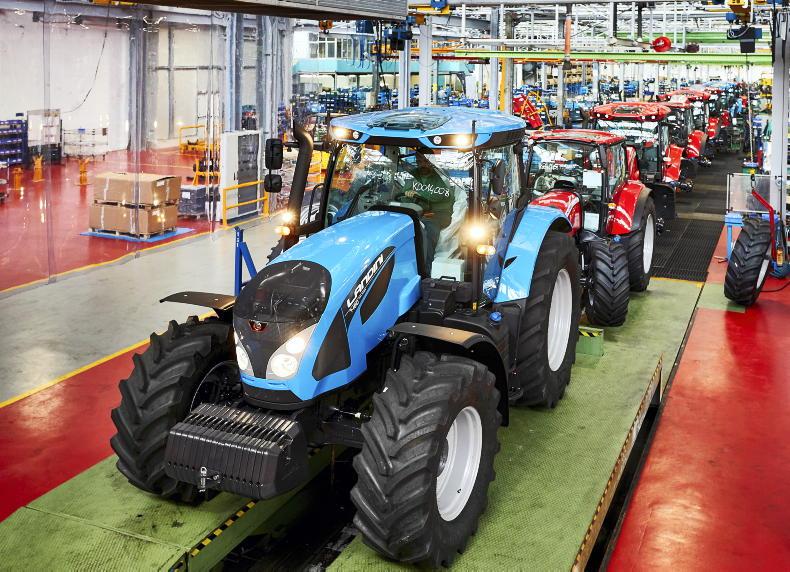




 This is a subscriber-only article
This is a subscriber-only article










SHARING OPTIONS: